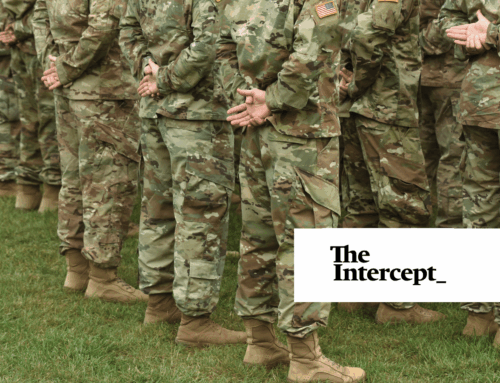After President Bush proposed the largest increase in defense spending in two decades, it's hardly surprising that the Pentagon is finding new – and wasteful – ways to spend taxpayer dollars. The Office of Strategic Influence (OSI) was set up to flack for the war on terrorism, and the Pentagon is now proposing to keep it open permanently. The problem is no one is sure what this small but very well financed office will do.
George Orwell couldn't have come up with a better name for a program whose yet-to-be -determined mission may include expensive public relations campaigns using the foreign news media, the Internet, and covert operations to win the hearts and minds of foreign citizens.
This propaganda machine was quietly created last November because the State Department's Office of Public Diplomacy and the Joint Chiefs of Staff Office of Information Operations evidently weren't doing a good enough job doing public relations for the War on Terrorism, although they continue to be financed too.
Very little is known about OSI, including how much taxpayer money has been spent or will be spent to permanently fund the operations of this mysterious bureaucracy. The OSI's multimillion-dollar budget was originally funded through last October's Congressionally-authorized emergency spending bill. However, if the OSI becomes a permanent spin machine for the Pentagon, it is likely to become a huge money pit.
The Rendon Group, a top Washington public relations consulting firm, has already received a contract from OSI for nearly $100,000 a month. After the Persian Gulf War, this same firm benefited from a secret CIA contract to wage a propaganda campaign against Saddam Hussein that, according to the Boston Herald, cost $23 million just the first year.
In explaining its efforts to the media, the OSI already seems to be practicing their spin techniques. They claim that their efforts will be as innocuous as convincing US enemies that an attack will come from the West, when in fact it is being waged from the North. Pentagon officials have promised not to lie to the public, but they have not made the same guarantees for contractors that they hire.
Classified proposals circulating in the Pentagon reportedly suggest a number of tactics that would involve OSI contractors spreading false information. These tactics include planting stories in the foreign press, conducting disinformation campaigns, and emailing influential foreign nationals pro-American messages that appear to originate at non-military organizations.
History shows that these types of tactics do more harm than good. Propaganda spread by the US government during the Vietnam War was responsible for an infamous “credibility gap.” Prior to the Gulf War, another DC public relations firm had a young Kuwaiti girl testify before Congress about Iraqi soldiers wrenching incubators away from premature babies. The testimony was instrumental in convincing some Senators to vote in favor of waging war on Iraq, yet it later became known that the story was false.
Although gaining popular support for American foreign policy is an important endeavor, there are other government agencies whose responsibility it is to conduct such campaigns. Any “legitimate” public relations efforts conducted by the OSI would be very duplicative. Spending millions to spread disinformation and to distort the truth is an improper use of taxpayer dollars and Congress should look closely at this misuse.










